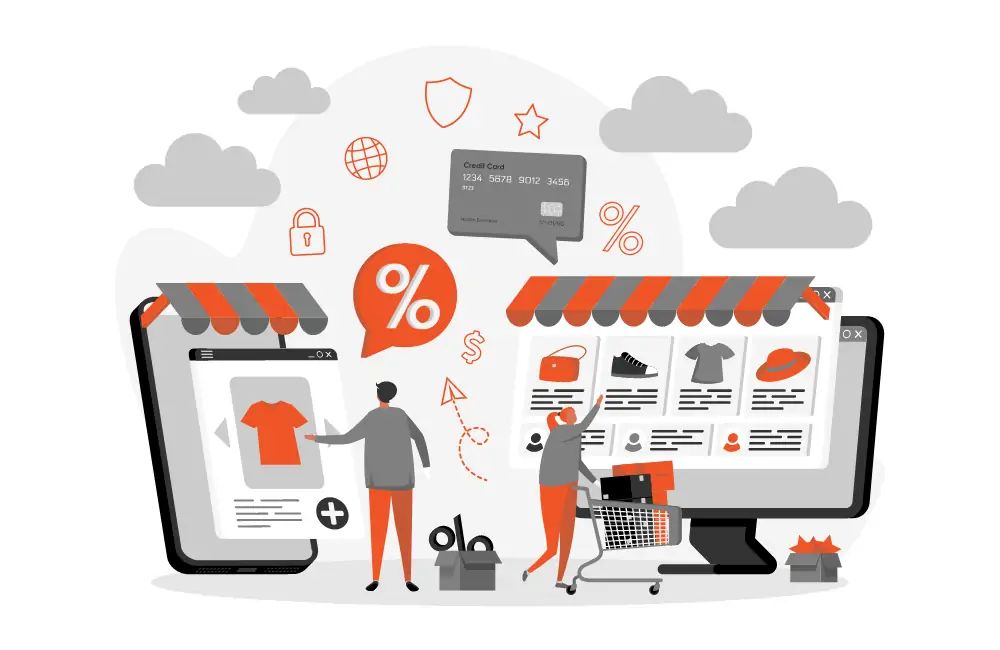Description
Custom E-Commerce Platforms
Custom E-Commerce Platforms
What is a Custom E-Commerce Platform?
A custom e-commerce platform is a tailor-made online shopping solution designed to meet the specific needs of a business. Unlike off-the-shelf solutions like Shopify, WooCommerce, or Magento, a custom platform is built from scratch or heavily customized to provide unique functionality, better performance, and scalability.
Key Features of a Custom E-Commerce Platform
✔️ Customizable Storefront & UI/UX – Unique design tailored to your brand identity
✔️ Scalable Architecture – Supports high traffic and business growth
✔️ Flexible Payment Integration – Supports multiple gateways (Stripe, PayPal, Apple Pay, Crypto, etc.)
✔️ Advanced Product & Inventory Management – Custom product attributes, real-time stock updates
✔️ Personalized Shopping Experience – AI-powered recommendations, dynamic pricing
✔️ Multi-Vendor Marketplace Support – Ability to manage multiple sellers (like Amazon, Etsy)
✔️ Custom Checkout & Cart Features – One-click checkout, abandoned cart recovery
✔️ Omnichannel Support – Syncs with mobile apps, social media, and offline stores
✔️ SEO & Marketing Tools – Built-in SEO optimization, email marketing, loyalty programs
✔️ Integration with ERP, CRM, and Third-Party Apps – Connects with accounting, inventory, and shipping services
Benefits of a Custom E-Commerce Platform
🔹 Unique Branding & User Experience – Stand out from competitors with a fully customized look
🔹 Greater Flexibility & Custom Features – No restrictions like pre-built platforms
🔹 Enhanced Security & Performance – Custom-built solutions are more secure & optimized
🔹 Scalability for Business Growth – Easily expand with more products, users, and features
🔹 No Platform Fees or Revenue Sharing – Avoid high commissions from SaaS platforms
Types of Custom E-Commerce Platforms
1. Business-to-Consumer (B2C) E-Commerce
🔹 Focus: Selling products directly to consumers
🔹 Examples: Custom-built online stores for fashion, electronics, groceries
🔹 Use Case: Direct sales, flash sales, personalized promotions
2. Business-to-Business (B2B) E-Commerce
🔹 Focus: Wholesale transactions and corporate buyers
🔹 Examples: Alibaba, Uline, Grainger
🔹 Use Case: Bulk pricing, custom invoicing, order approval workflows
3. Multi-Vendor Marketplace
🔹 Focus: Allowing multiple sellers to list and sell products
🔹 Examples: Amazon, Etsy, eBay-style platforms
🔹 Use Case: Vendor management, commission-based sales, product approvals
4. Subscription-Based E-Commerce
🔹 Focus: Recurring payment models for products or services
🔹 Examples: Netflix (digital services), Birchbox (physical products)
🔹 Use Case: Memberships, subscription boxes, digital content access
5. Headless E-Commerce
🔹 Focus: Backend commerce functionality separated from the front-end
🔹 Examples: Composable commerce with APIs (BigCommerce, Shopify Hydrogen)
🔹 Use Case: Custom frontend experiences for web, mobile, IoT devices
Custom E-Commerce Development Process
1. Requirement Analysis & Planning
- Identify business needs, target audience, and key features
- Choose technology stack (React, Vue.js, Node.js, PHP, Laravel, Python, Django, etc.)
- Decide on hosting (AWS, Azure, Google Cloud, or self-hosted servers)
2. UI/UX Design & Prototyping
- Create a responsive, mobile-friendly design
- Design custom themes, animations, and branding elements
- Ensure an intuitive checkout experience
3. Backend Development
- Build a custom CMS or integrate an existing one (Strapi, Contentful, WordPress API)
- Implement database management (MySQL, PostgreSQL, MongoDB)
- Develop secure payment processing & fraud prevention features
4. Frontend Development
- Implement a fast, SEO-optimized frontend
- Use React, Angular, Vue.js, or custom frameworks
- Optimize for speed, accessibility, and mobile responsiveness
5. Third-Party Integrations
- Payment gateways: Stripe, PayPal, Razorpay, Crypto payments
- Shipping & logistics: FedEx, UPS, DHL API integration
- Marketing tools: Google Analytics, Mailchimp, HubSpot CRM
- Chatbots & AI support: Drift, Intercom, Zendesk
6. Testing & Security
- Perform load testing, security audits, and bug fixes
- Implement SSL encryption, GDPR compliance, and anti-fraud measures
- Ensure fast page speeds with CDN and caching techniques
7. Deployment & Maintenance
- Deploy on cloud-based or dedicated hosting
- Set up continuous monitoring & updates
- Improve user experience with A/B testing and performance analytics
Use Cases of Custom E-Commerce Platforms by Industry
📌 Fashion & Apparel
🔹 Customizable product pages with 360° views
🔹 AI-powered size recommendations & virtual try-on
📌 Electronics & Gadgets
🔹 Dynamic pricing based on demand & competitor analysis
🔹 Product comparison & tech specs customization
📌 Grocery & Food Delivery
🔹 Subscription-based grocery delivery models
🔹 AI-based demand forecasting for restocking
📌 Automotive & Spare Parts
🔹 Custom-built vehicle parts finder
🔹 VIN-based product recommendations
📌 Luxury & High-End Goods
🔹 Personalized shopping experiences with AI chatbots
🔹 Augmented reality (AR) shopping for jewelry & accessories
Challenges in Custom E-Commerce Development
⚠️ Higher Initial Development Costs – Custom builds require more investment than off-the-shelf solutions
⚠️ Longer Development Time – Unlike Shopify or WooCommerce, custom platforms take time to develop
⚠️ Ongoing Maintenance – Requires regular updates, security patches, and performance optimization
⚠️ Scalability Planning – Needs a solid infrastructure to handle growing traffic and data









Reviews
There are no reviews yet.